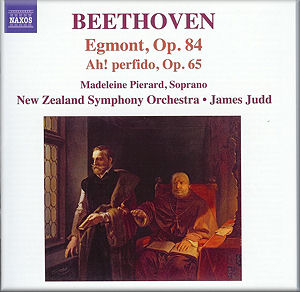 |
 |
|


alternatively
CD:
AmazonUK
AmazonUS
Download: Classicsonline
|
Ludwig van BEETHOVEN (1770 - 1827)
Egmont - incidental music to Goethe’s tragedy, Op. 84
(1810) [40:15]
1. Overture [9:03]
2. No. 1 Act I, Scene 3: Die Trommel gerühret! (Clärchen) [2:55]
3. No. 2 First Entr’acte: Andante [3:37]
4. No. 3 Second Entr’acte: Larghetto [5:48]
5. No. 4 Act III, Scene 2: Freudvoll und leidvoll (Clärchen) [1:28]
6. No. 5 Third Entr’acte: Allegro - Marcia, Vivace [4:18]
7. No. 6 Fourth Entr’acte: Larghetto [3:40]
8. No. 7 Act V, Scene 3: Death of Clärchen [2:38]
9. No. 8 Act V, Scene 4: Melodrama (Egmont) [5:23]
10. No. 9 Act V, Scene 4: Symphony of Victory [1:25]
11. March No. 1 in F major (Yorck’scher Marsch), WoO 18 [1:27]
12. March No. 2 in F major, WoO 19 [1:47]
13. Scena and Aria: Ah! perfido, Op. 65 [11:47]
 Madeleine Pierard
(soprano: 2, 5, 13), Claus
Obalski (narrator: 9) Madeleine Pierard
(soprano: 2, 5, 13), Claus
Obalski (narrator: 9)
New Zealand Symphony Orchestra/James Judd
rec. Michael Fowler Centre, Wellington, New Zealand, 10-12 February 2003 (1,
3, 4, 6-12) and Wellington Town Hall, 14-15 August 2007 (2, 5, 13)
Sung and spoken texts with English translations are included in the booklet.
 NAXOS 8.557264 [55:15] NAXOS 8.557264 [55:15] 
|
|
|
During the first years of the new century Beethoven had written
music for a ballet, Die Geschöpfe des Prometheus,
started working on his sole opera Fidelio and composed
an overture for Heinrich von Collin’s play Coriolan.
He was therefore no newcomer to writing for the stage when
the Court Theatre in Vienna commissioned incidental music for
Goethe’s Egmont for
the 1809-1810 season. Goethe’s play was written thirty
years earlier but the subject, a rebellion taking arms against
an oppressing invader, was still topical and for Beethoven this
subject must have been close to his heart, political freedom
always central to his ethics. It seems however that the last
spark of inspiration eluded him and the score wasn’t finished
in time for the premiere. At the third performance, three weeks
later, it was heard and it is likely that Clärchen’s
two songs were performed earlier. Maybe I am biased through
this knowledge but I have a feeling that some of the orchestral
pieces
are professional rather than deeply inspired.
The programmatic overture is rightly an established masterpiece,
maybe his best composition in this genre, and James Judd and
his admirable New Zealand forces present it in all its glory,
rather brisk and dynamic. But the four entr’actes fail
to inspire me, even though the Marcia in No. 3 is fresh
and attractive. It is not until the last act that I become
really engrossed in the music: Clärchen’s deeply-felt death,
Egmont’s Melodrama - excellently performed by Claus
Obalski - with its optimistic final pages followed by the symbolic Symphony
of Victory, which we already know from the end of the overture.
Clärchen’s two songs are another matter. They are
fresh and charming and immediately attractive, in particular Die
Trommel gerühret! (tr. 2), with its catchy melody
and swaggering march rhythm. I have long cherished Janet Baker’s
recordings of them on a thirty-year-old Philips record. Madeleine
Pierard is lighter and more lyrical, less formidable, but her
readings are very attractive and she sings extremely well.
Janet Baker’s is again one of my favourite readings of
the mighty Ah! perfido, a grandiose interpretation that
not even Birgit Nilsson and Christa Ludwig surpass. Ms Pierard
exposes however a dramatic voice with true bite while retaining
her beautiful rounded tone. The opening recitative is truly expressive
and Per pietà is sung simply and lyrically. Throughout
this is a very beautiful reading. This is a singer I hope to
hear more of.
The two short marches, contemporaneous with the Egmont music,
are rather brash. They were commissioned by Archduke Anton
and performed to celebrate the birthday of the Empress. The
celebrations
took place at a tournament, reason enough for the rather rough
quality. Beethoven knew what he was about and called them ‘music
for horses’.
Those curious for some not too often heard music by Beethoven
can safely invest in this well played disc. There is some fine
music from the last act of Egmont, the overture is a masterpiece
and one gets some great vocal items in the bargain. The sound
quality could hardly be bettered.
Göran Forsling
|
|












